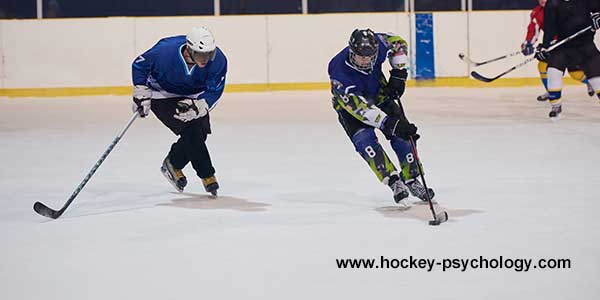
Learning to Manage Your Worries
The lessons you learn from hockey can be applied to real life situations… Just as real life lessons can be applied to circumstances you experience in hockey.
These valuable lessons can help hockey players get to the next level, just as they can push people to achieve their personal goals and success in various areas of life.
Success is never smooth sailing. In hockey and in life, you will hit some speed bumps, roadblocks and obstacles. For some hockey players, tough circumstances lead to fear and increased worry.
Excessive worry affects both the body and mind, potentially leading to: muscle tension, illness, injury, low confidence, doubts, negative self-talk, inability to focus and under-performance.
In terms of hockey, if you are playing goal and are worried about giving up a goal to lose the game, you will be anxious, agitated, unable to focus clearly on the action on the ice, tense and tight. All these factors contribute to making saves more difficult.
Worry doesn’t improve your game or improve your ability to overcome obstacles. Worrying about tough circumstances only serves to generate increased levels of worry, anxiety and panic.
Consider the following:
* No one has ever worried themselves to a hockey championship
* No one has ever worried themselves to more ice time during games
* No one has ever worried themselves to a much improved game
Worrying about your circumstances only makes matters worse in your personal life as well.
No greater example of personal worry exists than in today’s present state of the widespread COVID-19.
COVID-19 has disrupted the everyday lives of all people. School closings, quarantines, work layoffs, depleted savings, mounting bills and all kinds of uncertainty have made most people feel like they are losing control. Surely, you can relate to the increased worry that COVID-19 has caused in your life.
In fact, you may be experiencing greater amounts of worry than ever before due to the life altering COVID-19.
While the coronavirus deserves serious attention, worrying about all the ‘what ifs’ surrounding the virus has physical and emotional consequences.
Worry has increased among many NHL players as their season hangs in the balance due to COVID-19. Washington Capitals’ defenseman John Carlson has held worry at bay by focusing on the things he can control, such as maintaining his fitness.
CARLSON: “All I’m thinking about is trying to keep myself in the best shape I can with the circumstances and whatever the rest of the season holds. I’ll worry about that when I lace the skates up again.”
One lesson to be learned is that you have the power to minimize worry inside and outside the hockey rink.
With the increase of downtime due to the coronavirus, now is a good time to work on your ability to prevent excessive worry.
How to Manage Worry
The first step in managing your worry is to gain some insight into how you respond to challenging circumstances.
Answer the following questions:
1. What circumstances cause you to hit the panic button?
2. What specific thoughts or feelings increase your level of anxiety?
3. What physical symptoms do you experience when you worry excessively?
4. How has excessive worry affected your game in the past? How does your game change?
These questions will help you understand your underlying fear. Then, you can address it head on by rationalizing with yourself or your athletes.
Related Articles on Hockey Mental Game:
- How to Play Worry-Free Hockey
- Your Mindset and Finishing Hockey Games
- Tips for Positive Practice Habits in Hockey
*Subscribe to The Sports Psychology Podcast on iTunes
*Subscribe to The Sports Psychology Podcast on Spotify
Mental Coaching Programs for Hockey
Our mental game coaching programs for hockey players helps athletes improve confidence, concentration, let go of errors quickly, and stay composed during crunch-time. Read more about sports psychology for hockey players at Peaksports.com
Please contact me by phone at 888-742-7225 or by filling out the webform below to learn more about our personal mental training programs for hockey players or teams:
Leave a Reply